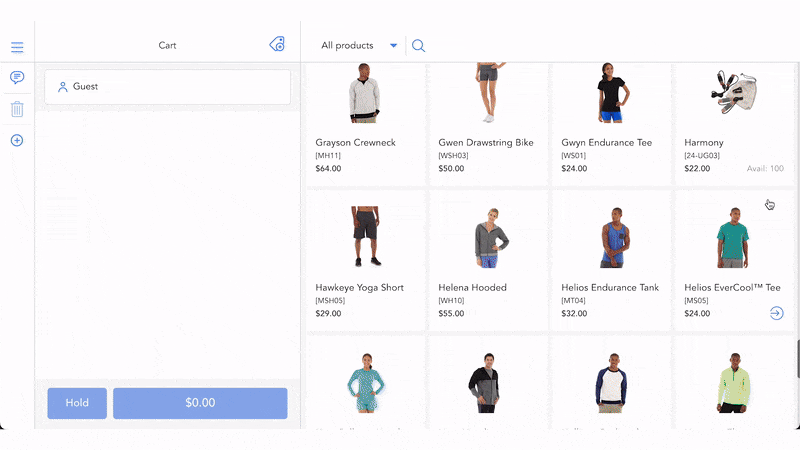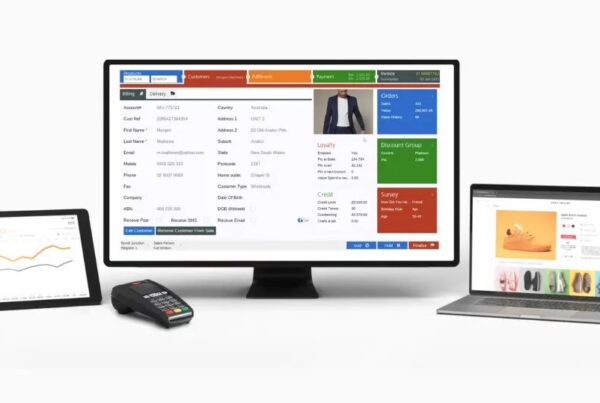Many people suppose that a small retail business doesn’t necessarily have a retail management system. Or even other people didn’t use to know about retail management meaning before. Whether you are finding the answer to “what is retail management?” or you want to know more about this term, this article will help you understand more about retail management definition, role, challenges, and best practices. Retail management guarantees that clients have a pleasant shopping experience and that they leave the store smiling. Simply put, retail management makes shopping easier for customers.
What is retail management?
Retail management refers to the process that retail owner or manager strives to run, maintain, and grow a retail business from the basic to complicated retail operations including employee, order, sales, inventory, fulfillment, warehouse, supplier, customer information, payment and accounting, etc. All these tasks are to make sure that consumers are satisfied with the products they purchase and will become potential loyalty customers.
You can define retail store management as all the actions necessary to attract customers to the store and meet their shopping demands. Of all tasks that retail brands are doing, retail operation management might be one of the most crucial things that determine business success.
This retail store management definition is a common term in the retail industry that all business owners should know. Because the final goal of any business is increasing profit and developing the retail brand identity, all things we need to do to remain an effective retail management system are to boost the relationship between customers, suppliers, products, and brands.

Why is retail management important?
Now that you understand “what retail management means”, you might be considering whether retail management is important to your retail business. To understand the role of any process in retail, we need to identify the influence of poor store operation management on customer experiences.
Imagine you are a customer shopping on brand A’s website. You pick your favorite dress and intend to wear it for a special party tomorrow. Because home delivery takes at least 2 days for you to get the dress, you decide to choose click and collect as the shipping method. However, while the retailer knows they have the dress in stock, they can’t find out exactly which store has it for you to pick up from. Now you have no other choice except to find another dress at another retailer.
As you can see, this is an instance where retailers cannot manage their products at different branches, making their customers leave the store and find another choice. Poor inventory management and visibility across different store brands and warehouses can lead to overstocking, stockouts, inefficient supply chain operations, and poor customer experiences.
Thus, any retail store’s success depends on effective retail store management. Individual store managers are essential components of any successful retail operation management approach. They look out for store personnel, aid in meeting sales targets, help preserve customer contentment, supervise the daily operations of the retail establishment, and support coworkers who could one day run retail stores.
Let’s examine how a strategic approach to retail management might benefit your business and your customers in more detail:
- Retail management optimizes internal processes such as inventory management, offline and online storefronts, warehouse operations, payment and accounting, and human resources.
- Retail management improves overall company cohesion.
- Retail store management improves customer experience and boosts customer satisfaction.
- Retail operation management contributes to business growth.
What is the 7-step process of retail management?
The retail management process used to be just about managing a single store in one location. Now it includes managing chain stores around the world, even managing virtual stores or shopping online. Thus, the retail operation management process is defined as the whole process of business administration, finance, and marketing.

Although each business owner will have different retail management strategies or solutions, overall, this is how retail brands manage and operate their business systems:
Solve customer problems
Retail success begins with focusing on the problem you want to solve rather than the solution you want to offer. Retail management aspirants can delve deep into the problem with the help of root-cause analysis techniques such as the 5 Whys method, allowing them to offer better solutions. Furthermore, strategically gathering and analyzing information about your competitors can assist retail managers in determining what aspects of the problem haven’t been fully or easily solved.
Do customer market research
Market research is the next crucial step in the retail management process to collect all necessary information about your consumers’ needs and preferences for the products and services. In this step, you can identify and evaluate the problem, and the impact of the problem you need to solve for your target customers. Understanding the customers’ demands will bring about so many benefits for all businesses.

Develop and test products and services based on market demand
Now you need to develop products and services that can solve all the problems of your customers. You should test anything innovative to determine its effectiveness. Test results can assist you in determining the strengths and weaknesses of your products or services, allowing you to focus on what you do best to solve the consumer’s problem. You can get feedback through a customer satisfaction survey to align with your customers’ wants and needs.
Address all monetary and legal issues
Cyber security and consumer privacy have emerged as top compliance risks in today’s retail industry, which retail management must address. Thus, to ensure your products are successfully released and get positive customer responses, retail managers need to deal with all related issues including quality certification, compliance audits, in-store staffing, back office systems, etc.
Implement products, services, and brands marketing
Marketing is a vital part of retail management strategy. Marketing activities should be used to raise awareness of your products and services, resulting in sales from your target audience. Pop-up shops, retail collaboration, and special in-store events can all help attract customers and increase sales.
Constantly improve and develop products and services
Retail managers should continuously improve to be able to stay and thrive in the retail industry. Retail managers can adopt an agile approach to their retail store management in effective ways. Regardless of the size of the company, the stage of growth they’re in, the customers they’re helping, the problem they’re solving, and the product or service they’re offering, they can try expanding their product or service offers, re-targeting their audience, and more.
Deliver excellent customer service
If you know that in reality, many other competitors can beat your products with any outstanding features easily, you also should know that customers can stay with you when you give them great customer service. Customer satisfaction is a key point to getting customers more interested in your business. Retail managers need to create and train their professional customer service staff to satisfy all customers to come and leave the store.

What are the challenges of retail management?
According to Forbes, in 2021, brick-and-mortar stores expanded faster than eCommerce, rising at a pace of 18.5% compared to eCommerce growth of 14.2%. Due to such a competitive retail landscape, to stand stable and develop in the dynamic retail industry, you need to meet all customer needs, give them effective and fast solutions, and have great shopping experiences. Work-life balance might be a difficult task for retail managers as they need to adapt to those unexpected changes quickly and effectively. Thus, the main possible challenges of retail management are:
- Attract customer loyalty
- Adapt to customer continual requirements
- Find the best technology solutions for your retail industry
- Maintain internal communication and interaction
4 retail store operations best practices

To optimize retail store operations for your business, retail managers can refer to these best practices:
5S principles:
5S Lean is a set of organizational principles that retail managers can apply to the design and layout of their stores. They are Sort, Set in order, Shine, Standardize, and Sustain. Thanks to the 5S principle set, both online and offline sales can benefit from focusing inventory and shelf space on what can turn quickly.
Daily back-front approach:
Retail managers can also take a proactive approach to retail management by practicing the backend approach of retail store operations on a daily basis. Moreover, they can start conducting a daily walkthrough from the backroom, where cleanliness and order are checked, to the sales floor and storefront, where to restock levels and customer engagements are monitored.
Focused customer experience:
Customers should come first. Establishing the rules of regular store opening and closing inspections helps ensure that customers have everything they need before entering and leaving the store. Personalization is one of the best ways to provide a great customer experience.
Advanced retail management software:
Choosing the best-fit retail system for your retail business is one of things you need to do right away. Depending on the scale of stores, you can custom your own retail software to meet all your business needs with Magestore RMS. From storefront to backoffice, operating your store chains becomes easier with our fast and scalable retail managemen system. Unlimited users without extra fees, and exclusive integration capability. Discover now!
The future of retail management
All we hope about the future landscape of retail management is that customers can shop online at their favorite stores, choose products they love, interact with customer care staff, and make a purchase without leaving the house. Retail management will be a crucial innovation step for every retail brand as long as they keep their customers at the center of everything they do, along with properly trained staff using the right tools.
If you are retail entrepreneurs, keep tabs on these major trends of retail industry to streamline retailing management, satisfy your customers, and boost sales for both your brick-and-motar and e-Commerce stores.
- Omnichannel integration
- Optimized inventory management
- Customer-centric approach
- Dynamic pricing
- Social commerce
- Multiple delivery options
- Recyclable or biodegradable packaging materials
- Customer data protection
- Micro fulfillment centers
- Virtual shopping
Final thoughts
In general, the key to successful retail operation management is to assemble and integrate various functions to provide customers with a great shopping experience through a well-curated product assortment and excellent store service. We hope that with this useful information, now that you understand the retail management definition, and gain not only more knowledge about the effective retail management process but also best practices that you can apply to come up with proactive retail management solutions for your business. Discover all Magestore products and solutions for retail to get better your business performance.
FAQs
What is good retail management?
A good retail management will help retailers to cut down time on running a or many retail stores and increase double sales for stores without needing many resources. In general, with effective retailing management strategies, ostacles will disappear and stores will witness better performance and profitability.
What are the three types of retail management?
There are three types of retail management:
- Human resource management: retailers need to manage staff and employee effectively to save time and cost.
- Operations management: merchants need to manage all store operations from storefront to backoffice to ensure a smooth and streamlined process.
- Strategic management: retail owners need to prepare plans and strategies to run and grow business in the future with the most optimal cost.















Nice Post!
This blog from Magestore delves into the concept of retail management, providing a comprehensive overview of its meaning and significance in the retail industry. It’s an informative resource for anyone interested in understanding the intricacies of running a successful retail business.
Thank you for your valuable information 🥰